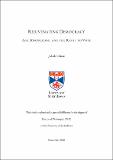Files in this item
Rejuvenating democracy : age, knowledge, and the right to vote
Item metadata
| dc.contributor.advisor | Etinson, Adam | |
| dc.contributor.advisor | Brown, Jessica (Jessica Anne) | |
| dc.contributor.author | Hinze, Jakob | |
| dc.coverage.spatial | xvi, 192 p. | en_US |
| dc.date.accessioned | 2021-06-14T15:57:57Z | |
| dc.date.available | 2021-06-14T15:57:57Z | |
| dc.date.issued | 2021-06-28 | |
| dc.identifier.uri | https://hdl.handle.net/10023/23356 | |
| dc.description.abstract | At the core of democracy is a simple idea: one person, one vote. However, all democracies disenfranchise citizens below a certain age. What justifies this practice? The answer seems obvious: voting isn’t a children’s game. When citizens head to the ballots, a lot is at stake: who runs the government and what policies are implemented significantly affects the lives of many citizens. According to a widely held view, voting requires a certain competence that children lack. If we take this idea a little further, we may conclude that adult citizens ought to demonstrate a certain level of competence before receiving the right to vote, too. However, most contemporary political philosophers reject this “epistocratic” line of thought. Either for epistemic, moral, or pragmatic reasons, they endorse enfranchising every adult. This raises the central question of this dissertation: can we justify giving the right to vote to all and only citizens above a certain age? I argue that we cannot. To establish this claim, I assess three different voting schemes: Standard Democracy, which gives exactly one vote to all and only citizens above a certain age; Epistocratic Democracy, which gives more voting power to “politically knowledgeable” citizens; and Ageless Democracy, which gives all citizens, regardless of age, the right to cast exactly one vote in democratic procedures. First, I defend Standard Democracy against Epistocratic Democracy. This amounts to an argument that all citizens above a certain age should have equal voting rights. I then evaluate potential justifications for conceding these rights only to citizens above a certain age, and reject them. This amounts to a case for Ageless Democracy. Abandoning the voting age is both a theoretically consistent implication of rejecting Epistocratic Democracy and a practically desirable approach to reinvigorating democratic procedures. | en_US |
| dc.language.iso | en | en_US |
| dc.publisher | University of St Andrews | |
| dc.rights | Creative Commons Attribution-NonCommercial-NoDerivatives 4.0 International | * |
| dc.rights.uri | http://creativecommons.org/licenses/by-nc-nd/4.0/ | * |
| dc.subject | Voting rights | en_US |
| dc.subject | Epistemic democracy | en_US |
| dc.subject | Epistocracy | en_US |
| dc.subject | Children | en_US |
| dc.subject.lcc | JF841.H5 | |
| dc.subject.lcsh | Voting age | en |
| dc.subject.lcsh | Suffrage--Philosophy | en |
| dc.title | Rejuvenating democracy : age, knowledge, and the right to vote | en_US |
| dc.type | Thesis | en_US |
| dc.contributor.sponsor | Philosophical Quarterly | en_US |
| dc.contributor.sponsor | Society of Applied Philosophy | en_US |
| dc.contributor.sponsor | University of St Andrews. St Leonard's College | en_US |
| dc.type.qualificationlevel | Doctoral | en_US |
| dc.type.qualificationname | PhD Doctor of Philosophy | en_US |
| dc.publisher.institution | The University of St Andrews | en_US |
| dc.identifier.doi | https://doi.org/10.17630/sta/74 |
The following licence files are associated with this item:
This item appears in the following Collection(s)
Except where otherwise noted within the work, this item's licence for re-use is described as Creative Commons Attribution-NonCommercial-NoDerivatives 4.0 International
Items in the St Andrews Research Repository are protected by copyright, with all rights reserved, unless otherwise indicated.


